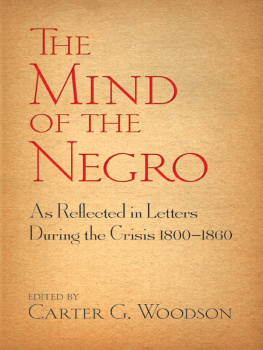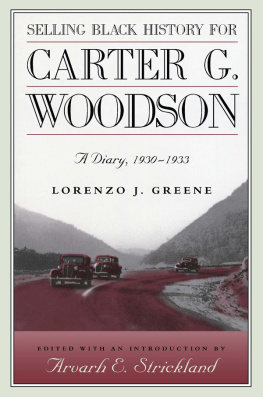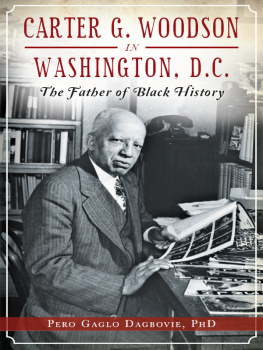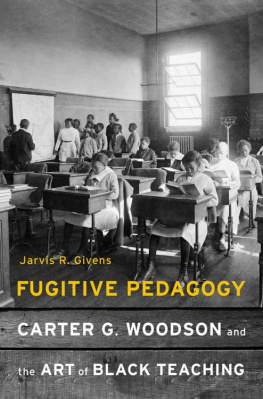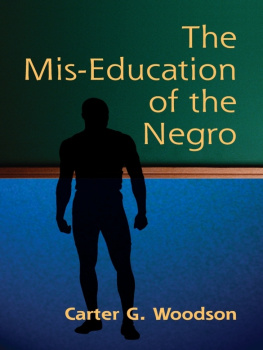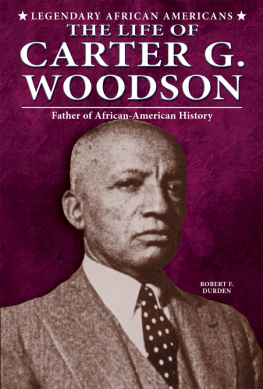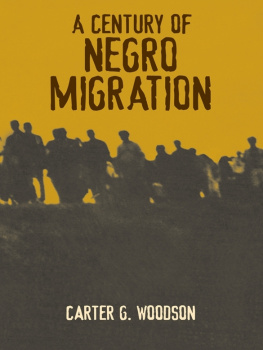Carter G. Woodson - The Mind of the Negro: As Reflected in Letters During the Crisis 1800–1860
Here you can read online Carter G. Woodson - The Mind of the Negro: As Reflected in Letters During the Crisis 1800–1860 full text of the book (entire story) in english for free. Download pdf and epub, get meaning, cover and reviews about this ebook. year: 2013, publisher: Dover Publications, Inc., genre: Religion. Description of the work, (preface) as well as reviews are available. Best literature library LitArk.com created for fans of good reading and offers a wide selection of genres:
Romance novel
Science fiction
Adventure
Detective
Science
History
Home and family
Prose
Art
Politics
Computer
Non-fiction
Religion
Business
Children
Humor
Choose a favorite category and find really read worthwhile books. Enjoy immersion in the world of imagination, feel the emotions of the characters or learn something new for yourself, make an fascinating discovery.
- Book:The Mind of the Negro: As Reflected in Letters During the Crisis 1800–1860
- Author:
- Publisher:Dover Publications, Inc.
- Genre:
- Year:2013
- Rating:5 / 5
- Favourites:Add to favourites
- Your mark:
- 100
- 1
- 2
- 3
- 4
- 5
The Mind of the Negro: As Reflected in Letters During the Crisis 1800–1860: summary, description and annotation
We offer to read an annotation, description, summary or preface (depends on what the author of the book "The Mind of the Negro: As Reflected in Letters During the Crisis 1800–1860" wrote himself). If you haven't found the necessary information about the book — write in the comments, we will try to find it.
The Mind of the Negro: As Reflected in Letters During the Crisis 1800–1860 — read online for free the complete book (whole text) full work
Below is the text of the book, divided by pages. System saving the place of the last page read, allows you to conveniently read the book "The Mind of the Negro: As Reflected in Letters During the Crisis 1800–1860" online for free, without having to search again every time where you left off. Put a bookmark, and you can go to the page where you finished reading at any time.
Font size:
Interval:
Bookmark:
THE
MIND
OF THE
NEGRO
As Reflected in Letters
During the Crisis 18001860
EDITED BY
CARTER G. WOODSON
INTRODUCTION TO THE DOVER EDITION BY
BOB BLAISDELL
DOVER PUBLICATIONS, INC.
MINEOLA, NEW YORK
Copyright
Introduction to the Dover Edition copyright 2013 by Dover Publications, Inc.
All rights reserved.
Bibliographical Note
This Dover edition, first published in 2013, is an unabridged republication of the work originally published by The Association For the Study of Negro Life and History, Inc., Washington D.C., in 1926.
International Standard Book Number
ISBN-13: 978-0-486-49839-3
ISBN-10: 0-486-49839-5
Manufactured in the United States by Courier Corporation
49839501
www.doverpublications.com
If a race has no history, if it has no worthwhile tradition, it becomes a negligible factor in the thought of the world, and it stands in danger of being exterminated.
Carter G. Woodson, Negro History Week
While Carter G. Woodsons title may suggest to us a psychological or sociological study, what it is, instead, is a book bursting with public and private letters that, without mediation, directly reveal, as Woodson repeatedly remarks in his brief notes, the mind of the negro. Rather than arguing his own ideas and analyses of the pre-Civil War American crisis, Woodson (18751950), the father of black history, presents the little-known letters by black freedmen, freedwomen, and slaves. He offers up a treasure trove of the American Colonization Society correspondence on Liberia as well as the published newspaper letters on abolition by the leading lights of African American communities in the North. Intent on publishing these letters for other scholars and the community as soon as possible, he thrust a wide variety of collections previously published in his Journal of Negro History into this volume.
As the son of slaves and as a Ph.D. in history from Harvard, Woodson knew through his life and studies that black men and women, when they werent simply misrepresented, had been excluded from or ignored by American history. Woodson needed this book in print so that it could reach readers in libraries, schools, and middle-class homes that his journal may not have reached. While The Mind of the
Woodson took great care as editor in the faithful reproduction of the private letters, with all their fitful spelling and punctuation; the letters that conclude this book were written for the most part by slaves and ex-slaves who had been forbidden in the South from learning to read or write or had been educated illegally by, among others, missionaries and literate slaves.concerns and wonderings of ordinary and extraordinary people who were able to articulate in writing their curiosity about or desire to emigrate to Liberia. Charles Deputie of Hollidaysburg, Pennsylvania, wrote in 1852 to the Reverend William McLain in Washington at the American Colonization Society: thare has bean men hear that has bean to Liberia and Lecterd to the People and gave Such a bad a Count of the place that it is hard to do much a preasant the Say that thare is nether Horse hog Cow nor nothing Can Live thare that the Natives ware no Close and thare is no Houses but the Govement House.
Woodson was ultimately skeptical and disapproving of the American Colonization Society: In fact, the colonization movement tended to drain off into the jungle the talented tenth of the free Negro population and thus rendered the race much less efficient at emancipation than it would have been had these enlightened members of the group been left undisturbed. As early as 1831, freedmen were doubtful of the ulterior motives of the colonization; A Colored Philadelphian wrote to The Liberator newspaper: I would ask some of our pretended white friends, and the members of the American Colonization Society, why they are so interested in our behalf as to want us to go to Africa? Will some of those guardian angels of the people of color tell me how it is that we, who were born in the same city or state with themselves, can live any longer in Africa than they? The Liberian experience, about which Woodson would write in later books, was not initially successful; in 1858, Alfred V. Thompson testified to his experiences as a colonist: Our reason for leaving Liberia, after living there for eighteen months, was on account of bad health Out of the company of emigrants that left America for Africa, numbering 225, at the expiration of the 18 months there was not living more than 85 or 100. We lost two children to the undertaking; my wife and myself suffered immensely.
More successful and of less debate within black America were those men and women who had escaped slavery and were making their way to thriving communities in British Canada. Their letters, some of which were written to family members unfortunately left behind, some of which were to former owners, are among the best letters in the collection. Perhaps because the letters say so much, Woodson scarcely explains what the men and women had experienced in their escapes, in their new homes, in their memories of their lives in the South. John Thompson, in an undated letter (probably from the mid-1850s) to his mother, proudly writes from Pennsylvania: I have imbrace an opportunity of writing you these few lines (hoping) that they may fine you as they Leave me quite well I will now inform you how I am geting I am now a free man Living By the sweet of my own Brow not serving a nother man & giving him all I Earn But what I make is mine and iff one Plase do not sute me I am at Liberty to Leave and go some where elce & can ashore you I think highly of Freedom and would not exchange it for nothing that is offered me for it. Frederick Douglass is the most accomplished, dynamic and fully represented figure among the featured correspondents. Douglass, Woodson notes, was so fiercely independent he could not maintain alliances with anyone for long, and on disputed matters, he sometimes simply devastated his old friends and made his way alone (a characteristic Woodson shared with Douglass): Unfortunately, near the outbreak of the Civil War, Douglass differed so widely from some of the anti-slavery workers that not very much of his correspondence was published in their organs.
To help explain Woodsons unframed, unchronological arrangement of the letters, its useful to remind ourselves that Woodson wasnt only the editor of the Journal and chief researcher, he was the Associations publisher, and because he was continually under-funded (he often used his own money for publication costs), he seemed to feel, If not now, then when? What if he were too late to instill and preserve cultural pride? The haste, however, came at a price, believes his biographer: Woodsons uncontainable enthusiasm for his subject and his sense of urgencyhe saw that there was so much to be done that he allowed imperfectly executed work for the sake of at least tackling a particular subjectaccount for the unevenness in his work. In fact he believed that he was laying the scholarly foundation for others to build upon. Often he failed to introduce or conclude chapters in his books; they merely began at the beginning of his story and ended at the end. The manner in which Woodson composed his books also explains, in part, both his prodigious output and his more than occasional expository inelegancy.
Because his primary interest was to bring the material into the light of day rather than wait for more money and the time to get all the material in order, be warned that this museum of fascination that is The Mind of the Negro is something of a labyrinth. Within the first part of Section II, we read of various Antislavery Letters of the Negroes, starting in 1831, ending in 1833, and wandering in between with letters from Upper Canada and London and Pennsylvania, and in the next part we jump back to an arcane political dispute in Canadas Wilberforce Colonization Company in the early 1830s. As if from various folders in his Washington, D.C., office Woodson was packing the trunk for quantity rather than for the ease of access or speed of unpacking. He laid in one set of proofs from
Next pageFont size:
Interval:
Bookmark:
Similar books «The Mind of the Negro: As Reflected in Letters During the Crisis 1800–1860»
Look at similar books to The Mind of the Negro: As Reflected in Letters During the Crisis 1800–1860. We have selected literature similar in name and meaning in the hope of providing readers with more options to find new, interesting, not yet read works.
Discussion, reviews of the book The Mind of the Negro: As Reflected in Letters During the Crisis 1800–1860 and just readers' own opinions. Leave your comments, write what you think about the work, its meaning or the main characters. Specify what exactly you liked and what you didn't like, and why you think so.

